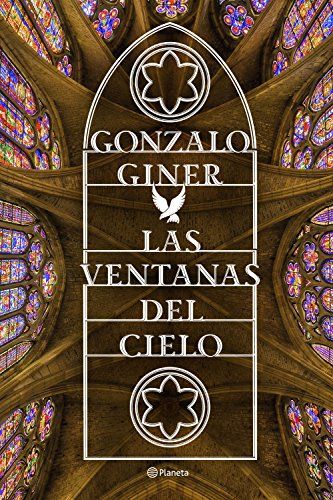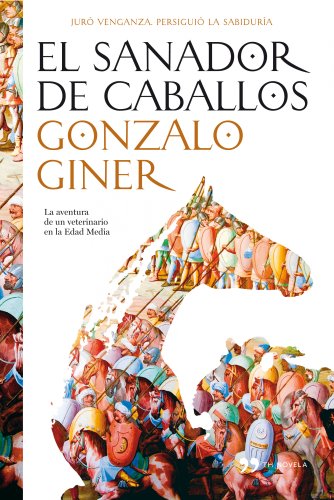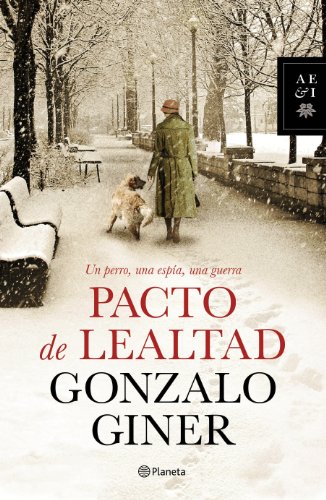Recently, in the entry dedicated to the author Jose Calvo Poyato, we made reference to the varied casuistry that leads the writer from birth or forge to opt for historical fiction as the essential background of his bibliography.
It is true that on many occasions the creative vein in this genre comes from the more academic dedication to History or Art, both with capital letters. But history is per se, material for the learned and the layman, a kind of well of wisdom that anyone can delve into to quench that thirst for storytelling.
The case of Gonzalo giner is that of the curious transformation of a veterinarian into historical novel writer. And attest to the success he has achieved, he has known how to arm himself with all that baggage and that heritage gathered from interest, will and information.
But in addition, the exceptionality usually contributes differential aspects that are no less interesting. The veterinary knowledge of a professional like Gonzalo Giner ended up serving him for one of those brilliant hybrid compositions in which two different areas end up generating extremely rich intersecting arguments.
I am referring to novels such as "The Horse Healer" or "Pacts of Loyalty", historical narratives in which the communion between man and animal serve to weave absolutely magical aspects in all the works ...
Gonzalo Giner's Top 3 Recommended Books:
The windows of heaven
The emblem of the great buildings of antiquity continues to be a source of fascination in many respects. From the pyramids of Egypt or the Chinese wall to any European cathedral. It is not just about assessing how they were built with meager resources. We are also amazed at the information of the historical period that each element contains. And the stained glass windows of the cathedrals have so much to tell us ...
Historical novels are more suggestive in that they focus on characters drawn from authentic intrahistory, beyond monarchs, nobles, lords and others. And this novel "The Windows of Heaven" abounds in that tendency to tell what we were through the fictionalized experiences of people from the town.
The will of the protagonist Hugo de Covarrubias and his adventurous spirit plus his eagerness to meet and learn make him the ideal character with whom to share a trip to the past, in this case to the XNUMXth century.
Young Hugo already understands that his destiny is not in Burgos, the place where he grew up and where the world was gradually becoming small. He could have bet on continuity, for earning a leading role in parental business, but he knows that his happiness would not be there. The happiness of a person in the fifteenth century or now is to be carried away by the dictates of the soul.
A restless soul like Hugo enjoys the frenetic adventure, not without risks. He embarks on a ship that takes him to Africa. There he did well, love awaited him, personified in Ubayda, and when he was again driven to flee he did so this time accompanied by her.
And sometimes the miracle happens. Only a restless person, willing to know the world, can find its safest destiny. Back in Europe, Hugo learned about the technique of stained glass, that wonderful system that relieved the weight of the walls and that illustrated biblical scenes with deceptive plays of light. Hugo works hard at the art of creating those windows of heaven into which the faithful looked out to discover the magnificence of God.
The horse healer
That the Arab world contributed to the peninsula a lot of scientific, medical, architectural, and other wisdom, is undeniable. Perhaps that is why I found this novel interesting in its aspect of recognition of those wise men from the south who left their mark on so many vicissitudes of those days.
Because the character of Galib the veterinarian happens to be one of those great experts in his science for animals in his case. Except that circumstances rule and the development of the narrative will confront precisely the Muslim world from which Galib comes with the Christians launched on the reconquest.
But before this happens, we enjoy Galib's relationship with Diego de Malagón, in whom he will awaken the love for science of the Muslim albéitarians (our veterinarians) until Diego and Galib face in a skirt dispute that will ruin their relationship . Only Diego has already felt the bug of the new science call him strongly.
While the peninsula is awakening towards the reconquest, we discover a Diego immersed in the knowledge of the horses and finally introduced as a spy in the caliphate, until everything learned finds an even warlike channel to recover the Christian land from the Muslims.
Pact of loyalty
We advance several centuries in History and we are approaching that recent past in which some testimonies still accompany, with the emotion of what we experienced, the worst of the civil war. We move to 1934, shortly before the start of the conflict.
There we meet a Zoe who suffers from very different angles the harshness of a life that confronts her with the coming war, in the form of various revolutions, with the violent loss of her husband and the discovery of her infidelities.
As if that were not enough, he must leave his great manor house once his father has fallen from grace and taken to jail. To survive his misfortune, he only has his Champion dog with whom he can share sadness and misery, lightening the heavy burden of an existence so cruelly transformed from one pole to another, from happiness to sadness in a few dates.
Champion, with his instinct defending his own, must gather the forces that his mistress fails to face a new life on the street, where the only law is that of the strongest.
Only Champion he is, he is very strong and absolutely faithful. His only mission, the only task he will face with pride, will be to save Zoe from any danger.



